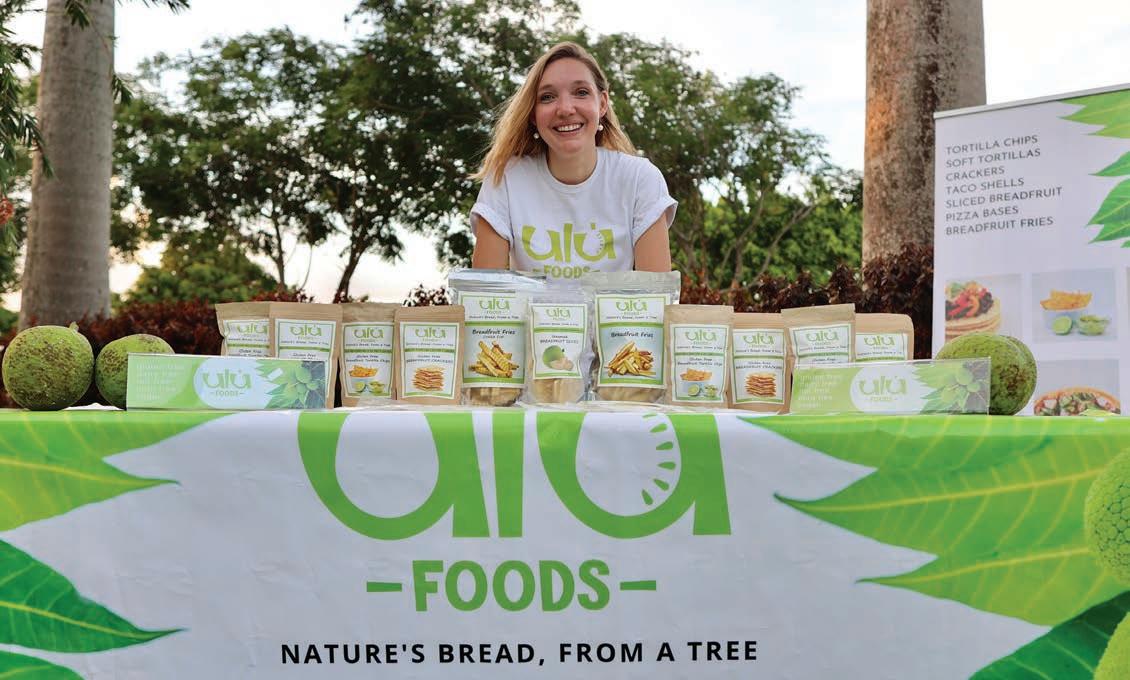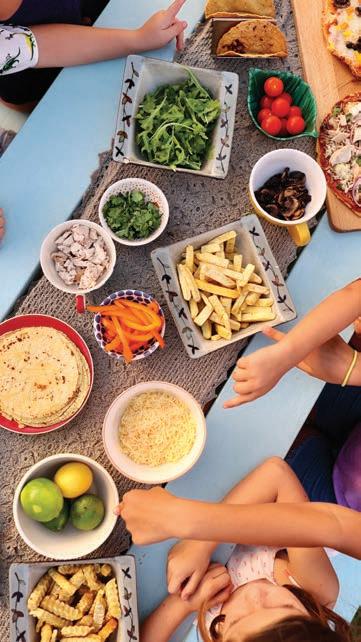
3 minute read
ULU FOODS
Promoting the Grain-Free Goodness of Breadfruit
Having previously worked as a Management Consultant for various Fortune 500 companies, Texas born Courtney Mills ventured to Africa to pursue her passion for poverty alleviation. While living in Kenya in 2010, she founded Sinapis, a business accelerator for start-up entrepreneurs. Today, Sinapis has expanded throughout Africa and beyond as a global network support system. In 2019, Courtney and her family relocated to Barbados when her husband took up a posting on the island.
Advertisement
Courtney Mills
After spending nearly ten years in Kenya and building up Sinapis, it was hard to leave it all behind. But the idea of moving to Barbados held great appeal for us, especially as by then we had two young children. After arriving in August 2019, it took us several months to move into a new home, get the kids into school, and generally get organized. Then, just as we started to feel settled, along came the pandemic.
The toughest aspect we had to deal with was that our kids have bad allergies and autoimmune conditions, so we were living a mostly grain-free lifestyle. All of a sudden, the pandemic protocols closed down the supermarkets and made shopping for the specialty foods we needed just about impossible. Things got even worse when flights from the US were shut down and that cut off our additional supplies via Amazon. Desperate to find a solution, for the first time in my life I started to look at what was growing around me.
That’s how I got introduced to the breadfruit. A local farmer gave me a couple and told me he liked to roast them in an open fire, so I adapted his method by using a barbecue. When I cut the first cooked one in half and scooped out the middle, I was astonished by how much it reminded me of bread dough. It seemed like an incredible discovery, and I couldn’t understand why the rest of the world didn’t know about this easy-to-get food.
When I started experimenting, by making grain-free bread substitutes for things like pizza bases, tortillas, crackers, even pasta, I was amazed by the fruit’s versatility. And the kids absolutely loved it all. As I started to better understand and appreciate the huge potential of breadfruit, it struck me that this was the start of a new phase in my life. It was what I wanted to spend at least the next ten years doing.
After immersing myself into lots of research, other things gradually started to fall into place. While I was doing my research, I found out about Trees That Feed Foundation - a global organization that provides trees and education for communities in need of food securityand found out they’d done quite a bit of work in Barbados with breadfruit trees. And I loved that whole support system concept. Straight away I knew this project was going to tick all my boxes. Breadfruit could provide an amazing new way to make exceptionally nutritious, grainfree foods, with a real capacity to make an enormous impact on hunger and poverty alleviation. Plus, it would be very sustainable and particularly good for the environment because the supply chain revolves around planting trees. There and then, I decided to donate a percentage of any future profits to the Trees That Feed Foundation to help them continue with their excellent work.
Trees that Feed introduced me to Barney Gibbs, their local liaison in Barbados, and he suggested that I go to see Richard Armstrong, of Sunbury Harvest, who had planted breadfruit trees on his property and was already growing and processing sweet potato and cassava. Richard allowed me to use his facility to run experiments with my breadfruit products, as well as some cassava. After the trials went very well, I offered to take over most of the factory related operations, producing my new breadfruit items and his sweet potato and cassava products at the same time. Once we had agreed on an arrangement, I built a new commercial kitchen inside the factory.
After deciding to call the business Ulu Foods, which is another name for breadfruit, I launched in the market in May 2021. We started out with an online shop offering breadfruit fries, tortilla chips, pizza bases, crackers, tortillas, taco shells and steamed slices. It was really just a way to gauge the response from consumers. But within a month Massy wanted our products in all their supermarkets, and other shops and specialty stores soon came on board. That meant we had to scale up quickly. After learning what people loved and didn’t like at all, we made a few adjustments and pressed ahead. The overall progress was sufficiently encouraging that I soon decided to expand the business. While visiting the States to look for new machinery lines and equipment, I also explored possible future export avenues. I want to become a sort of Breadfruit Ambassador in the USA. While there is a lot of benefit from having our Ulu products on US shelves, there is equal benefit in being able to convince major global brands to try using breadfruit flour in their products. www.ulufoods.com

My ultimate goal is to take the grainfree goodness of the island of Barbados to homes all over the world.












